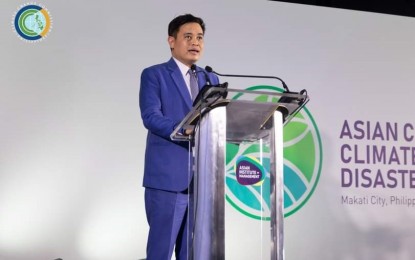
CCC Vice Chairperson and Executive Director Robert E.A. Borje (Photo courtesy of CCC)
MANILA – The Climate Change Commission (CCC) has called on stakeholders to do "bayanihan" in addressing the climate crisis and strengthening regional and national climate change and disaster resilience.
In his "Call to Action and Collaboration" at the Asian Conference on Climate Change and Disaster Resilience (ACCCDR) on Aug. 10, CCC Vice Chairperson and Executive Director Robert E.A. Borje urged all stakeholders to form part of a global, concerted effort to urgently address climate change.
“Our collective resolve will allow us to do more to save lives and protect the livelihoods of the present and future generations,” Borje said.
In view of Asia’s climate and disaster vulnerabilities, Borje emphasized the need for climate change to be mainstreamed in the country's socio-economic development planning and implementation.
Under President Ferdinand Marcos Jr.’s leadership, the Philippine government embedded climate change in the Philippine Development Plan 2023-2028.
The plan specifically embodies "Chapter 15: Accelerate Climate Action and Strengthen Disaster Resilience."
As climate change now underpins human development and human security, Borje said climate change must be the "lynchpin for all of the policy formulation, planning, and implementation.”
He likewise underscored the key roles of government agencies and legislators, business and private sector leaders, academic and research institutions, civil society and non-government organizations, and international and regional organizations particularly on the need to do “bayanihan" and to further intensify collaboration, nurture innovative solutions and exhibit accountability across sectors and nations.
“I call on everybody, it is time for us to work very closely together, and it should bring out the very best in the Philippines and every Filipino," he stressed.
Reflecting on the event theme, “Building Bridges: Driving Collective Action for a Climate and Disaster Resilient Asia,” Borje reminded the participants that “building bridges is not just a metaphorical concept but a moral imperative to achieve the desired resilience for us all.”
“The challenge is now—we must challenge ourselves to do better for our sake, and for our world's future,” he said.
Representatives from the private sector, government, civil society and non-government organizations, international organizations, and the academe also pledged their commitment to collective action.
The ACCCDR brought together thought leaders, policymakers, climate and disaster experts, practitioners and scientists, and advocates to discuss critical issues on climate and disaster resilience in Asia.
The event was presented by Aboitiz Power Corporation in partnership with the CCC, Asian Institute of Management, NOW Corporation and EASD Environmental Consultancy. (PR)
